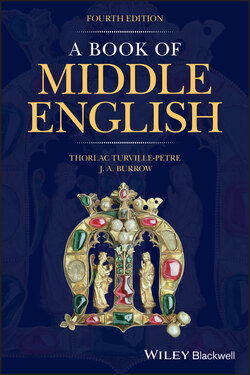Читать книгу A Book of Middle English - J. A. Burrow - Страница 78
5.6.10 The Passive
ОглавлениеThe passive is most often expressed by the verb be: he … wæs wæl underfangen fram þe pape Eugenie, ‘he was well received by Pope Eugenius’, 1/63. Until the end of the fourteenth century it was also expressed by worthe, ‘to be, come to be’, particularly in a future sense: blessid þou worth, ‘may you be blessed’, 11/340; þou worst wiþ ous yborn, ‘you shall be carried off with us’, 5/174.
Only one verb, hoten, has a passive form, hat(te), ‘is called’ or ‘was called’: as hit now hat, ‘as it is now called’, 9/10. Increasingly hiʒte, in origin the active past tense, was used in a passive sense: his sone hihte, ‘his son was called’, 7b/82.
The indefinite pronoun man was frequently used where Modern English uses a passive construction; see 5.4.3.
